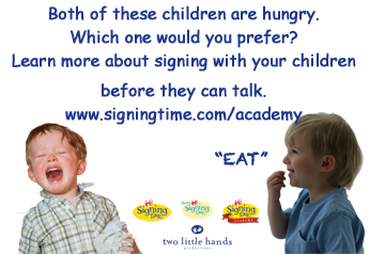Research

Child development expert Joseph Garcia discovered how easily hearing babies of deaf parents learned sign language, he also noticed that these babies appeared less demanding than babies who didn't know sign language because they could express their thoughts and needs more easily. Garcia figured, if a baby can sign for what he wants instead of screaming, everyone will be happier.
So why shouldn't hearing parents of hearing babies enjoy the benefits of signing, too?
Parents may worry that teaching their baby to sign will interfere with normal speech development . In fact, according to research, the opposite is true: Signing may actually improve language and vocabulary. Signing, as Garcia points out, is about enhancing, not replacing language. It has to be used alongside normal speech so your baby can make the link between the gesture and the word. And because you need to make sure your baby is looking at you, he's concentrating hard on what you're saying as well as on what you're doing. When your baby can sign back, communication becomes two-way.
The benefits of sign language for children with limited ability to express themselves can also be powerful. Children who have been diagnosed with autism, cerebral palsy or down syndrome to name a few, "can provide a bridge to support a child's ability to gesture more frequently and with greater complexity, and provide more information about the meanings of words, events, concepts and relations. Children who have motor deficits may find it challenging to use sign language accurately but because of their exposure to sign language, they have the ability to express novel ideas through gestures. The child is able to see that they are in fact, a communicator and that their message is received and acted upon within their environment. They are also able to share experiences, which leads to a more powerful desire to communicate further. The power to be understood and to send messages that are received readily fosters more intentionality and the desire to make more meaning within one's world; they become more empowered the more they feel understood by others. " (Quoted from The Power of Sign Language Helps Children with Autism Create Meaning in Language by Michele Ricamato, M.A. CCC-Speech and Language Pathologist from West Chicago, Illinois.)
Research
So why shouldn't hearing parents of hearing babies enjoy the benefits of signing, too?
Parents may worry that teaching their baby to sign will interfere with normal speech development . In fact, according to research, the opposite is true: Signing may actually improve language and vocabulary. Signing, as Garcia points out, is about enhancing, not replacing language. It has to be used alongside normal speech so your baby can make the link between the gesture and the word. And because you need to make sure your baby is looking at you, he's concentrating hard on what you're saying as well as on what you're doing. When your baby can sign back, communication becomes two-way.
The benefits of sign language for children with limited ability to express themselves can also be powerful. Children who have been diagnosed with autism, cerebral palsy or down syndrome to name a few, "can provide a bridge to support a child's ability to gesture more frequently and with greater complexity, and provide more information about the meanings of words, events, concepts and relations. Children who have motor deficits may find it challenging to use sign language accurately but because of their exposure to sign language, they have the ability to express novel ideas through gestures. The child is able to see that they are in fact, a communicator and that their message is received and acted upon within their environment. They are also able to share experiences, which leads to a more powerful desire to communicate further. The power to be understood and to send messages that are received readily fosters more intentionality and the desire to make more meaning within one's world; they become more empowered the more they feel understood by others. " (Quoted from The Power of Sign Language Helps Children with Autism Create Meaning in Language by Michele Ricamato, M.A. CCC-Speech and Language Pathologist from West Chicago, Illinois.)
Research
- Signing with Babies and Children
- Resources for Individuals with Autism
- Resources for Individuals with Down Syndrome
- The Power of Sign Language Helps Children with Autism Create Meaning in Language
- K-6 Education: Signing in Your Classroom
- Early Childhood Educators (Workshops available with PD Hours Certficiate )

